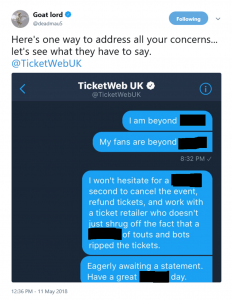Inspired by the following tweet (with expletives removed) from popular electronic music artist Deadmau5, my next Reimagined post will be focused on TicketWeb. However, this is equally relevant for any of the multitude of ticketing platforms available. Even my beloved Liverpool FC have recently been working with private investigators who specialise in ticket touting to tackle these issues, and this is something I believe can be alleviated greatly by a digital solution.

One of the biggest issues as a regular attendee to sports and music events is ensuring you are getting a genuine ticket at a reasonable price. Waiting eagerly before repeatedly refreshing your browser across multiple devices; only to find you have been pipped to the post by a bot. You then must turn to a resale site, and often pay significantly above the retail price. This then transpires to be a fake ticket, which you only find as you get to the event. You receive a refund from the resale site, but you have missed the event.
Ticket platforms need to provide a service which directly tackles the use of bots, guarantees the authenticity of the ticket, and provides the user with a sense of trust. An important component of this is in digitising the tickets, ensuring there can only be one version of each ticket, where ownership can only be transferred via the digital service for the original retail price. This ensures all tickets are genuine and will be owned and only accessible to the person who will be attending the event. One of the great advantages of this initiative will be ownership of the customer record for the ticketing platform, which today is not possible, where often one person will buy a few tickets for their group of friends. This will also ward off bots being used as there is no profit to be made in resale.
The current resale sites are often owned by the original ticketing platform, and so they see a percentage of the resale for facilitating the transaction. This can still be offered as a service for allowing the transfer of the digital ticket between two users, and so is unlikely to reduce revenue significantly, outside of the sales which go to bots and then are not resold. However, by guaranteeing that all tickets are with a real person, and this person will use it at the point of entry to the event, there is the additional potential to gather great user data to improve the service based on actual attendance to events. This can be used to build smarter recommendation engines to provide more personalised recommendations for future events, and possible integration with relevant services such as Spotify.